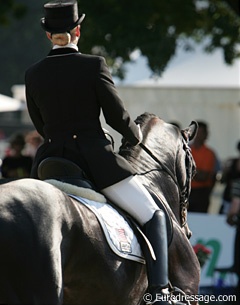
In response to a recent incident at an international competition, the US Dressage Federation Executive Board has issued the following official statement:
The USDF does not approve of training techniques such as hyperflexion especially when taken to an extreme. While we recognize that we can not control how riders train at home, excessive techniques should not be tolerated at competitions. The USDF feels that it is very important that as a sport we police ourselves and encourage the USEF and FEI to call upon their licensed officials to ensure that cruel and abusive riding does not happen at our competitions.
The USDF agrees with and strongly supports the FEI position as stated in the November 17 press release and in particular the statement: "The FEI acknowledges and welcomes public opinion and will continue to ensure that the welfare of the horse, which has been central to this debate, will remain its absolute priority."
USDF Statement on Animal Welfare
The United States Dressage Federation, Inc. (USDF), a federation of over 125 independent organizations throughout the United States with a membership in excess of 33,000 members, supports the concept of ethical treatment of animals.
Dressage is a classical method of training horses, based upon the horse’s natural responses, as carried out in a gradual, planned pro- gram during which the horse’s athletic abilities are improved in a systematic manner. As a result, the horse becomes capable, comfort- able, and responsive in partnership with the rider without the use of force. Dressage competition at various levels of achievement is the ultimate test of the training program to determine whether the desired harmony between horse and rider has been achieved.
The rules pertaining to dressage competition prohibit the use of artificial appliances, training aids, and drugs, which would force the horse to submit. Instead, the emphasis is upon training and a cooperative partnership with the rider. Major competitions are carefully monitored to assure that there is no unnecessary force or harshness displayed.
Unlike other horse sports in which horses enter training at a relatively immature state, dressage training is usually not seriously begun until the horse is three or four. The top levels of achievement require five or more years of progressive training and it is not unusual to see horses in international competition in their late teens. This, in itself, places a premium on good care and soundness throughout the horse’s life.
While supporting the concept of animal welfare in its broadest form, the United States Dressage Federation, Inc., also recognizes that it is unrealistic to ascribe human emotions and responses to the horse which in its wild state is a creature of flight, living a hard and precarious existence. Under domestication, the horse is assured of ample food, water, and shelter, as well as protection against infec- tious diseases and damaging parasites, thus leading a longer and healthier life with a high rate of survival.
As an educational organization, USDF has numerous programs, which teach people how to pursue the accepted, humane training meth- ods. A program of certifying instructors also emphasizes protecting the horse’s welfare in pursuit of dressage training.
Related Links
FEI Releases Statement Following Hyperflexion Discussion
Rollkur Topic of Discussion at FEI General Assembly
David Holmes Makes Statement on Rollkur Issue at 2009 Global Dressage Forum